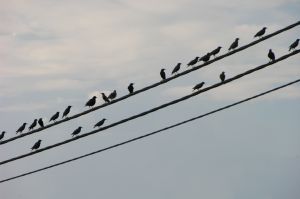Why do the birds face the same direction?
Scientists believe the main reason that birds face the same way on a wire is due to the direction of the wind. Birds have an easier time taking off and landing facing the wind.
Birds sit on power lines, trees, roofs or any perch, facing into the wind. Any other direction would ruffle their feathers. It's also easier to communicate.
How can birds sit on electrical wires and not get electrocuted?
When birds are only in contact with one power line, they are not forming a complete circuit, so the electricity does not flow through them. Unfortunately, some larger birds, like hawks and eagles, have been electrocuted when they stretch their wings into another power line, completing the circuit.
When you see lots of birds on the wires, is bad weather coming?
I'm not sure why I had so many question about birds on the wires this week. It might be due to the bad weather mid-Michigan is experiencing right now.
Most birds have a special middle-ear receptor called the Vitali organ, which can sense incredibly small changes in barometric pressure. So if the activity at feeders suddenly becomes much more intense a storm may be approaching. Also, birds flying low or lining up on power lines can indicate swiftly falling air pressure.
Birds watch birdwatchers watching birds.
Or you may be noticing more birds because it's still light out now after work. Some birds even seem to like watching us as much as we watch them because it seems they flock around the busier intersections. And the migration of blackbirds is underway. Populations of birds we haven't seen for months will finally arrive to begin nesting.
Thank you for all the interesting questions.
Category ›
Quick fun Facts
 Unknown
Unknown
 Tuesday, March 8, 2011
Tuesday, March 8, 2011












No comments:
Post a Comment